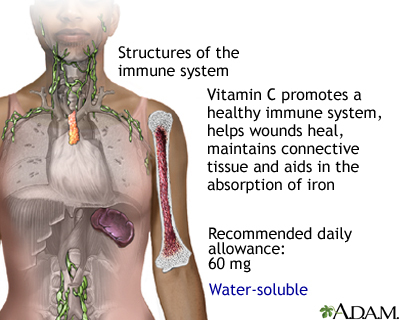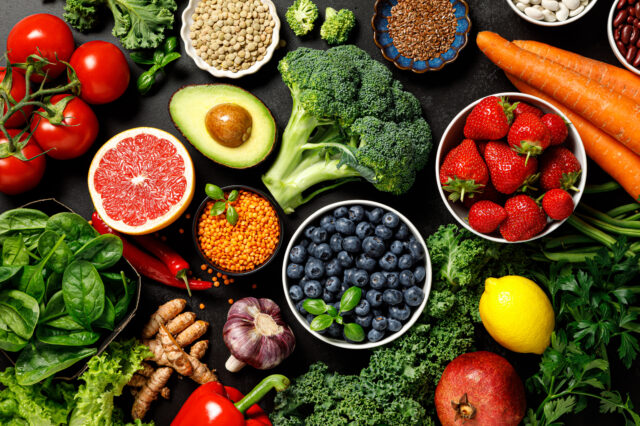Definition
Vitamin C is a water-soluble vitamin. It is needed for normal growth and development.
Water-soluble vitamins dissolve in water. Leftover amounts of the vitamin leave the body through the urine. Although the body keeps a small reserve of these vitamins, they have to be taken regularly to prevent a shortage in the body.
Alternative Names
Ascorbic acid; Dehydroascorbic acid
Function
Vitamin C is needed for the growth and repair of tissues in all parts of your body. It is used to:
- Form an important protein used to make skin, tendons, ligaments, and blood vessels
- Heal wounds and form scar tissue
- Repair and maintain cartilage, bones, and teeth
- Aid in the absorption of iron
Vitamin C is one of many antioxidants. Antioxidants are nutrients that block some of the damage caused by free radicals.
- Free radicals are made when your body breaks down food or when you are exposed to tobacco smoke or radiation.
- The buildup of free radicals over time is largely responsible for the aging process.
- Free radicals may play a role in cancer, heart disease, and conditions like arthritis.
The body is not able to make vitamin C on its own. It does not store vitamin C. It is therefore important to include plenty of vitamin C-containing foods in your daily diet.
For many years, vitamin C has been a popular household remedy for the common cold.
- Research shows that for most people, vitamin C supplements or vitamin C-rich foods do not reduce the risk of getting the common cold.
- However, people who take vitamin C supplements regularly might have slightly shorter colds or somewhat milder symptoms.
- Taking a vitamin C supplement after a cold starts does not appear to be helpful.
Food Sources
All fruits and vegetables contain some amount of vitamin C.
Fruits with the highest sources of vitamin C include:
- Cantaloupe
- Citrus fruits and juices, such as orange and grapefruit
- Kiwi fruit
- Mango
- Papaya
- Pineapple
- Strawberries, raspberries, blueberries, and cranberries
- Watermelon
Vegetables with the highest sources of vitamin C include:
- Broccoli, Brussels sprouts, and cauliflower
- Green and red peppers
- Spinach, cabbage, turnip greens, and other leafy greens
- Sweet and white potatoes
- Tomatoes and tomato juice
- Winter squash
Some cereals and other foods and beverages are fortified with vitamin C. Fortified means a vitamin or mineral has been added to the food. Check the product labels to see how much vitamin C is in the product.
The best food sources of vitamin C are uncooked or raw fruits and vegetables. Cooking vitamin C-rich foods or storing them for a long period of time can reduce the vitamin C content. Microwaving and steaming vitamin C-rich foods may reduce cooking losses. Exposure to light can also reduce vitamin C content. Choose orange juice that is sold in a carton instead of a clear bottle.
Side Effects
Serious side effects from too much vitamin C are very rare, because the body cannot store the vitamin. However, amounts greater than 2,000 mg/day are not recommended. Doses this high can lead to stomach upset and diarrhea. Large doses of vitamin C supplementation are not recommended during pregnancy. They can lead to shortage of vitamin C in the baby after delivery.
Too little vitamin C can lead to signs and symptoms of deficiency, including:
- Anemia
- Bleeding gums
- Decreased ability to fight infection
- Decreased wound-healing rate
- Dry and splitting hair
- Easy bruising
- Gingivitis (inflammation of the gums)
- Nosebleeds
- Possible weight gain because of slowed metabolism
- Rough, dry, scaly skin
- Swollen and painful joints
- Weakened tooth enamel
A severe form of vitamin C deficiency is known as scurvy. This mainly affects older, malnourished adults.
Recommendations
Recommendations for vitamin C, as well as other nutrients, are provided in the Dietary Reference Intakes (DRIs) developed by the Food and Nutrition Board at the National Academies of Sciences, Engineering, and Medicine. DRI is a term for a set of reference intakes that are used to plan and assess the nutrient intakes of healthy people. These values, which vary by age and sex, include:
Recommended Dietary Allowance (RDA): The average daily level of intake that is enough to meet the nutrient needs of nearly all (97% to 98%) healthy people. An RDA is an intake level based on scientific research evidence.
Adequate Intake (AI): This level is established when there is not enough scientific research evidence to develop an RDA. It is set at a level that is thought to ensure enough nutrition.
Dietary reference intakes for vitamin C:
Infants (AI)
- 0 to 6 months: 40* milligrams/day (mg/day)
- 7 to 12 months: 50* mg/day
Children (RDA)
- 1 to 3 years: 15 mg/day
- 4 to 8 years: 25 mg/day
- 9 to 13 years: 45 mg/day
Adolescents
- Girls 14 to 18 years: 65 mg/day
- Pregnant teens: 80 mg/day
- Breastfeeding teens: 115 mg/day
- Boys 14 to 18 years: 75 mg/day
Adults
- Men age 19 and older: 90 mg/day
- Women age 19 year and older: 75 mg/day
- Pregnant women: 85 mg/day
- Breastfeeding women: 120 mg/day
The best way to get the daily requirement of essential vitamins, including vitamin C, is to eat a balanced diet that contains a variety of foods.
Smokers or those who are around secondhand smoke at any age should increase their daily amount of vitamin C an additional 35 mg per day.
Women who are pregnant or breastfeeding and those who smoke need higher amounts of vitamin C. Ask your health care provider what amount is best for you.
References
Litwack G. Vitamins and nutrition. In: Litwack G, ed. Human Biochemistry. Philadelphia, PA: Elsevier; 2018:chap 20.
Mason JB, Booth SL. Vitamins, trace minerals, and other micronutrients. In: Goldman L, Schafer AI, eds. Goldman-Cecil Medicine. 26th ed. Philadelphia, PA: Elsevier; 2020:chap 205.
Markell M, Siddiqi HA. Vitamins and trace elements. In: McPherson RA, Pincus MR, eds. Henry's Clinical Diagnosis and Management by Laboratory Methods. 24th ed. Philadelphia, PA: Elsevier; 2022:chap 27.




